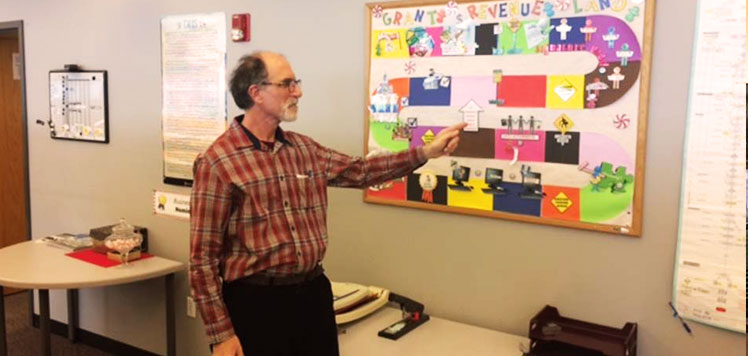This week, we speak with Ben Levek, grants manager for the Denver Department of Human Services (DHS). Ben is noted for his passion for his work, entrepreneurial thinking and systemic look at social change.
1. Tell us about you and the social change you are trying to achieve within the structure of a government agency.
“As grants manager, I have an opportunity and a passion to improve the lives of marginalized and disenfranchised persons—a role and responsibility I take very seriously. One of the unique aspects of my job is that my office functions as both grantor and grantee (we receive grants and we make grants). As a grantee, I have the opportunity to try to read between the lines of what a grantor is saying in a request for proposals (RFP) and what they may be really open and receptive to; as a grantor, I can write RFPs that are customized to our specific objectives and community needs. I have been fortunate to be not only a witness, but to be on the forefront of major public sector changes; for example, how the federal government overhauled the entitlement program formerly known as AFDC and now known as TANF. As such, I’ve witnessed how the community advocates, government workers, etc. make adaptations, adjustments, respond to opportunities and even have reflexes as if in response to threats. All of that has helped inform how I play my role and my ability to be part of social change. Another major city initiative that I’ve been very involved with is the startup of Denver’s Road Home Initiative, described as a 10-year plan to end homelessness. In retrospect, it seems lofty and ambitious, but the intention was to grapple with homelessness in a way that approaches things differently. Many stakeholders are involved in ways like never before. My goal in working with the public sector is to be vigilant that it is increasingly more receptive and responsive to changing business practices and approaches. My work is for the greater good, not for myself nor even limited to the parochial interests of my agency—it’s for the greater good.”
2. What keeps you inspired and going when things get tough?
“My strategy and inspiration comes from making sure we keep our eyes on the prize. That is the name of a folk song that was very influential during the civil rights movement of the 1950s and ’60s, the history of which had a big influence on me personally. I tend to use that phrase a lot as an inspiration for keeping me grounded, focused and staying with the program. I also try to identify and find kindred spirits who share my values, whether professionals or in various fields, because none of us want to be wandering alone in the wilderness, and social change doesn’t happen in a vacuum.”
3. What advice would you give to someone who is trying to innovate within government?
“To anyone in the government sector trying to achieve social change, I would say absolutely, you have to be able to be patient. You have to align yourself with influential allies within government who are willing and able to stick their neck out for your causes. This can mean people in higher executive positions than you, but who are committed, have the same values and are willing to take the same kinds of risk. I also encourage anyone trying to innovate to make sure they take as much of the relevant training as they can. The City of Denver offers a lot of relevant trainings within its various programs—take advantage of those.”
4. What book do you recommend to everyone you meet and why? OR What book is on your to-read list and why?
“On my list is a book called Change or Die by Alan Deutschman. It really lends itself to personal life, professional life, business, service, etc. The author’s premise is that we all have the ability to change our behavior, but we rarely do. Some examples he gives are: repeat offenders of the criminal justice system, businesses trapped in unsuccessful business practices, chronic heart disease, and so on. We have the power to change these things by changing our mindset. ‘Relate, Repeat and Reframe’ is his framework.”
5. How have you worked with Joining Vision and Action, and how has that helped your organization?
“In a multitude of ways—but especially through research, training/technical assistance and grantwriting. Denver Human Services has received millions of dollars in grants through our partnership with JVA. More important than money, JVA has helped serve as a catalyst for helping improve our clients’ lives and affect positive community impacts.”
6. What else would you want to share with us that we haven’t asked?
“I keep my ‘work battery’ charged by serving as an (informal) mentor to, and student of, younger, emerging professionals who bring different backgrounds, skills and perspectives to their work. I learn a ton from them (maybe more than they learn from me)! I share my public sector grants management experiences as both a grantor and grantee and hope they become involved in the next generation of changemakers.
“Lastly: sometimes people ask me if the City of Denver is really committed to social change. I’d have to say: without a doubt! The PEAK Academy trains and coaches city staff to improve the way government works. Some of its values include making Denver the most well run city in the nation and failure leads to breakthrough.”
Joining Vision and Action is proud to count DHS as a longstanding partner in our efforts to make Denver a more “thrive-able” place. Learn more about our inspiring clients and partners on our website. And stay tuned every Monday for more blogs profiling changemakers in Denver and beyond!







Leave A Comment